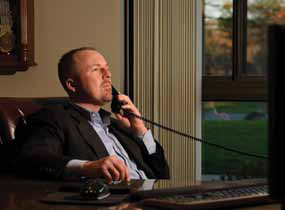Managing From Afar

A daily selection of features, industry news, and analysis for AV/IT professionals. Sign up below.
You are now subscribed
Your newsletter sign-up was successful
Keeping in Touch With Your Remote Locations
Whether you’ve got two locations or 200, the minute you expand your business outside of the company’s headquarters demands that a balance be struck between how much control head office retains and how much autonomy branch managers are given. How top management makes this division is dependent on the organization’s culture as well as its customers.
Headquartered in Tampa, FL, AVI -SPL has more than 30 offices across the U.S. Chief operating officer Don LaNeve explained that due to client demand, the systems integration firm takes a standardized approach: “Many years ago when we only had a dozen or so offices, it became apparent that more and more of our national clients wanted us to provide an identical solution regardless of which of our offices performed the work,” he said. “In order to feel confident that each of our offices could deliver on this promise, we chose to standardize our processes and procedures across the nation.” He noted that the key to accomplishing this effectively is training, which resulted in the creation of a training department that develops ‘learning plans’ for all integration employees. “Although this is a time-consuming and a costly initiative, it guarantees nearly identical solutions for our clients regardless of geographical location.”
At AVI -SPL, back-office support, such as accounting, purchasing, marketing, training, and IT , is centralized at the Tampa headquarters. “Conversely, each office is responsible for driving sales in their region,” LaNeve explained. General managers are tasked with full profit and loss responsibility, demanding them to run their businesses as required in order to meet their financial goals. “Using this as our primary gauge, we are able to coach the general managers who need help without interfering in the business of those who don’t.”
Systems contracting firm CCS Presentation Systems has three locations, including its headquarters in Hawthorne, CA. David Riberi, CEO, noted that what has helped the organization’s two remote locations succeed is that their managers are extremely familiar with how headquarters operates. “Our remote offices are managed by—or at least the offices were started by—people who worked for us in our main location,” he explained. “They learned the ropes, they see how I make decisions and they know the standards that we want to maintain.” He added that this also contributes to a smooth transferal of the company’s overall culture outside head office.
Riberi emphasized that in order to manage branches effectively, the organization’s leadership must have the right people in place. “We have made mistakes in the past when it came to hiring our branch managers,” he admitted. “Sometimes, they can be too inwardly-focused, and they concentrate on their own affairs without focusing on the needs of others.” For Riberi, management is a reverse-pyramid: “Management needs to support the front-level people. If you get somebody that doesn’t understand they are there to help everybody, that is a big mistake.”
LaNeve underlined that good communication is paramount to ensuring that all of his organization’s branches are running smoothly. “The key to success is ensuring that our branch offices are aware of, and buy into, our company vision,” he said. “Good two-way communication is vital to make us one cohesive team across the country.”
A daily selection of the top stories for AV integrators, resellers and consultants. Sign up below.
Carolyn Heinze is a freelance writer/ editor.
Inside/Outside
While headquarters should aim to maintain good communication with branches, David Riberi, CEO of CCS Presentation Systems in Hawthorne, CA, warned against treating everyone in exactly the same manner: “You can’t treat remote people like the employees that you have in your main office, because they are most definitely not.” Due to the demands of local markets, he noted that ‘outside’ employees may approach their work slightly differently, which can require an extra communication effort from those who work at headquarters. “I work from home sometimes to see what an outside person is dealing with because I want to see what works well, and what doesn’t, for those in our remote locations.”
Managing a Hand-Picked Team

Boston, Massachusetts-based SIGNET Electronic Systems is the largest privately-held systems integration company in New England. Since joining the family business in 1987, Brad Caron, president and CEO, has overseen the company’s growth from eight to nearly 150 employees, and from $1.8 million in annual revenues to approaching $30 million.
Having grown up alongside the company—Caron spent his boyhood summers making service calls alongside his father who had begun SIGNET as a four-man service operation in 1974—he knows that a company’s success is about more than just understanding an industry, it’s about understanding people. Caron attributes SIGNET’s continuing growth to its talented workforce, and in particular, its managers. “We wouldn’t be where we are today without the knowledgeable people who work here,” he said. Caron and his handpicked team of experts have managed to guide the once mom-and-pop business onto the cutting-edge of the 21st century.
What is his secret to success? Caron shares a few of his management philosophies:
* Put your ego aside “When you are dealing with a senior management team, there is no room for ego. These are your point people, the drivers of your business, people who have great gifts,” Caron explained. “Because these people are gifted, they are highly compensated, and they deserve more recognition than you. Let them put their stamp on the business, and don’t be afraid to take a backseat to their success.”
* Empower your managers “I’m always looking for quality people to fill quality spots,” Caron noted. “But sometimes finding a really strong person and analyzing their abilities can help me recognize a need I may have been unaware of. You don’t want people who will ‘yes’ you to death. As president, it’s my job take a step back to forecast long-term strategies and trends, and to keep my eye on the bottom line. And while it’s not my nature to sit at a desk and read reports, it’s easier for me to balance that with getting in the trenches and getting my hands dirty because I trust my managers. You have to empower them to do their jobs.”
* Lead by example “Be the first to arrive at work and the last to leave,” he emphasized. “I learned that from my father in the early days. I believe that people are going to work hard for someone they know is working hard.” SIGNET’s vice president of operations, Dawn M. Mello, corroborates Caron’s guiding principle of walking the walk. “Throughout SIGNET’s growth from a small business, Caron is still very much a “hands-on” presence,” Mello observed. “That’s what a good leader is able to do—to be on the same level as the people and on the level beyond. His work ethic and dedication are inspiring and emanate down to his management team.”
Carolyn Heinze has covered everything from AV/IT and business to cowboys and cowgirls ... and the horses they love. She was the Paris contributing editor for the pan-European site Running in Heels, providing news and views on fashion, culture, and the arts for her column, “France in Your Pants.” She has also contributed critiques of foreign cinema and French politics for the politico-literary site, The New Vulgate.
